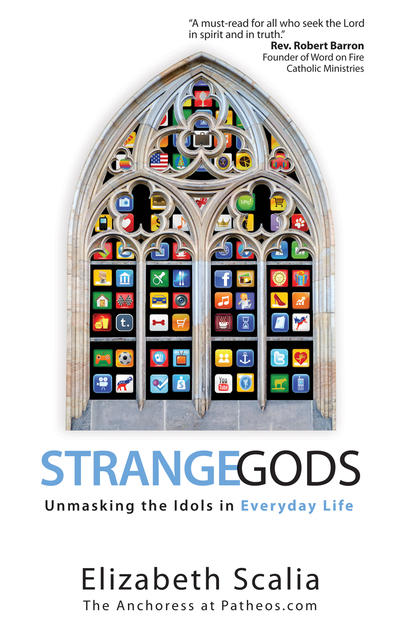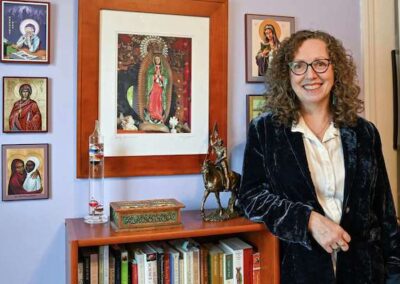For I don’t know how long now, I’ve been carrying around Elizabeth Scalia’s book, Strange Gods: Unmasking the Idols in Everyday Life. It’s in my purse, on my desk, in my suitcase, on my nightstand, on the coffee table, on the counter. It had become a little like a permanent appendage, and still I hadn’t read more than a few pages here and there because I wanted to wait until I could give it my undivided attention, but I don’t have undivided attention. Ever.
Recently, however, I was working on a project, and I thought maybe I’d find a pearl of wisdom in Elizabeth’s book, something I could quote, because Elizabeth is nothing if not a pearls-of-wisdom kind of gal. So I sat at my desk reading the introduction and into chapter one, and by page 15, the book was already littered with little sticky notes marking important thoughts I wanted to come back to for reflection. I was right: pearls of wisdom. And she was just getting warmed up.
For me the following passage early on in chapter one caught me right where I was at that particular moment on a winter afternoon when I was searching for wisdom and maybe a little light in my spiritual darkness:
“To place anything – be it another deity or something more commonplace like romantic love, anger, ambition or fear – before the Almighty is to give it pre-eminence in our regard. To become too attached to a thought or feeling or thing is to place it between God and ourselves. When we attach ourselves to something other than God, God’s presence is blocked, unseen, and disconnected from our awareness. The straight line between creature and Creator is then impeded, and – as with most unwise detours – disorientation follows.”
To be honest, I know I’d read those pages before, when I first got my copy of the book, but I’m sure I was distracted (see opening paragraph), and so I wasn’t fully paying attention. This time when I heard them – stuck as I was in what felt like a “most unwise detour” that was, in fact, getting in the way of my relationship with God – the words hit me full force, as if Elizabeth herself had taken a copy of the book and bopped me on the head. I wouldn’t put it past her to do that to me, you know, in only the kindest Christian way, like a Zen monk smacking a meditation student with a stick in order to prod him to enlightenment.
The fact that this early passage was followed in rapid succession by a scene from Moonstruck, one of my all-time favorite movies which I’ve managed to work into in two of my own books, just cemented my love for Strange Gods before I even got to chapter two. But that chapter and all the others that follow will take you where you need to go this Lent, even if you don’t know it yet, even if – or especially if – you’re going there kicking and screaming.
“Jesus wants us to get out of our own way. He wants us to take the wayward thoughts that divert our footsteps towards the I – the crowded detours that eventually will trap us far from God – and cast them aside,” Elizabeth writes in chapter two. I hate it when she’s right. And she’s right a lot in Strange Gods. Uncomfortably right. Curses. Oh, wait, that’s probably not the proper response from someone who is trying to get out of her own way.
This is hard work, but beautiful work for Lent, and in this culture of ours where so much of our lives – at least for yours truly – is lived in the fishbowl of Facebook and Twitter and Instagram, it is necessary work. Because those helpful social media tools, the same things that allow me to promote my books and pilgrimage and blog posts, can also ensnare me in an I-focused world where image and attention and accolades become more important than evangelization and charity and prayer.
If you do not yet own a copy of Strange Gods, order one now. If you have a copy but are waiting for an hour free from distraction, forget that grand plan and dig in right away. What you will soon realize is that this book is going to be the thing that helps you clear the distractions – and loosen the hold of the idols — and reclaim some of the time you need for spiritual reading, prayer, and straightening out the crossed wires that are keeping you from communicating with God.








